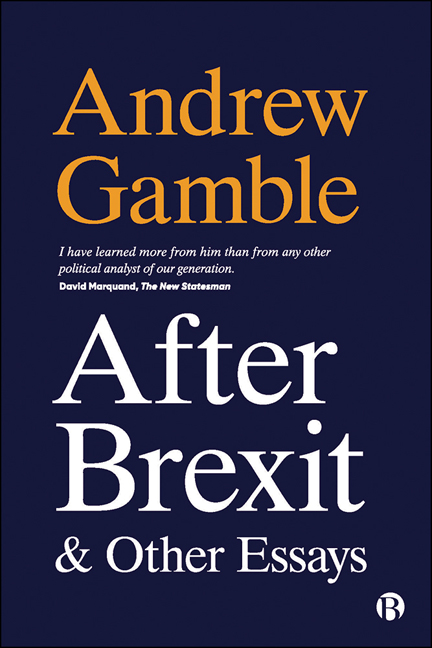Book contents
- Frontmatter
- Dedication
- Contents
- Preface
- Introduction: Historical Contexts
- Notes on the Essays
- 1 After Brexit (2019)
- 2 Explanations of British Decline (1999)
- 3 The European Disunion (2006)
- 4 The Anglo–American World View (2019)
- 5 The Free Economy and the Strong State (1979)
- 6 Thatcherism and Conservative Politics (1983)
- 7 Economic Growth and Political Dilemmas (1983)
- 8 The Crisis of Conservatism (1995)
- 9 The Thatcher Myth (2015)
- 10 Theories of British Politics (1990)
- 11 The Constitutional Revolution in the United Kingdom (2006)
- 12 What’s British about British Politics? (2016)
- Epilogue: Last Thoughts
- Notes
- Acknowledgements
- Index
2 - Explanations of British Decline (1999)
Published online by Cambridge University Press: 22 December 2021
- Frontmatter
- Dedication
- Contents
- Preface
- Introduction: Historical Contexts
- Notes on the Essays
- 1 After Brexit (2019)
- 2 Explanations of British Decline (1999)
- 3 The European Disunion (2006)
- 4 The Anglo–American World View (2019)
- 5 The Free Economy and the Strong State (1979)
- 6 Thatcherism and Conservative Politics (1983)
- 7 Economic Growth and Political Dilemmas (1983)
- 8 The Crisis of Conservatism (1995)
- 9 The Thatcher Myth (2015)
- 10 Theories of British Politics (1990)
- 11 The Constitutional Revolution in the United Kingdom (2006)
- 12 What’s British about British Politics? (2016)
- Epilogue: Last Thoughts
- Notes
- Acknowledgements
- Index
Summary
Decline has no single meaning. It has always been a contested term and is dependent upon seeing the world and Britain's place within it in a particular way. It does not have a fixed or objective character and cannot be directly observed. It depends on a particular historical and political construction of evidence and experience, which is open to quite different interpretations.
Amid the mass of assertions and counter-assertions, decline often appears to have as many meanings as there are explanations for it. If a term can be as widely defined as this, does it have any objective reality at all? Like many other contested terms in social science, however, the diversity of meaning arises from the origin of the term in political experience and conflict. Contests over its meaning and its implications have been a key part of the discourse of twentieth-century politics. Decline is a concept which many British politicians, from Joseph Chamberlain to Margaret Thatcher, have used to understand the world around them and urge particular courses of action. Its different meanings are therefore closely tied to the various strategies for halting or managing it which have emerged at different times and in different contexts during the last hundred years.
Decline has become an inextricable part of Britain's political reality in the twentieth century and has engaged the attention of many leading historians, economists and political scientists as well as columnists and leader writers. It is hard to think of a major public intellectual who has not contributed in some form to the decline debate. It has produced a lively academic and journalistic literature on whether there really has been a decline and if so how it is best measured, and whether there are any policies which might reverse it. Many of the disagreements about the meaning of decline are hard to settle, although that does not mean that rules of evidence and relevance which narrow the area of controversy cannot be established. But even if future historians were to agree that in some of the senses in which the term has been used Britain's decline was an illusion, it would still be necessary to ask why so many British politicians on both left and right viewed the world through the lens of ‘decline’ and advocated ambitious programmes to overcome it.
- Type
- Chapter
- Information
- After Brexit and Other Essays , pp. 37 - 56Publisher: Bristol University PressPrint publication year: 2021

